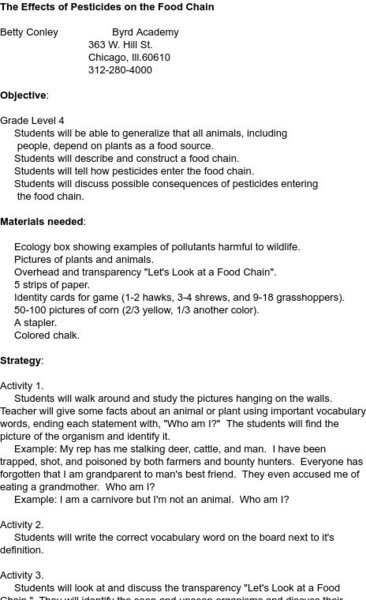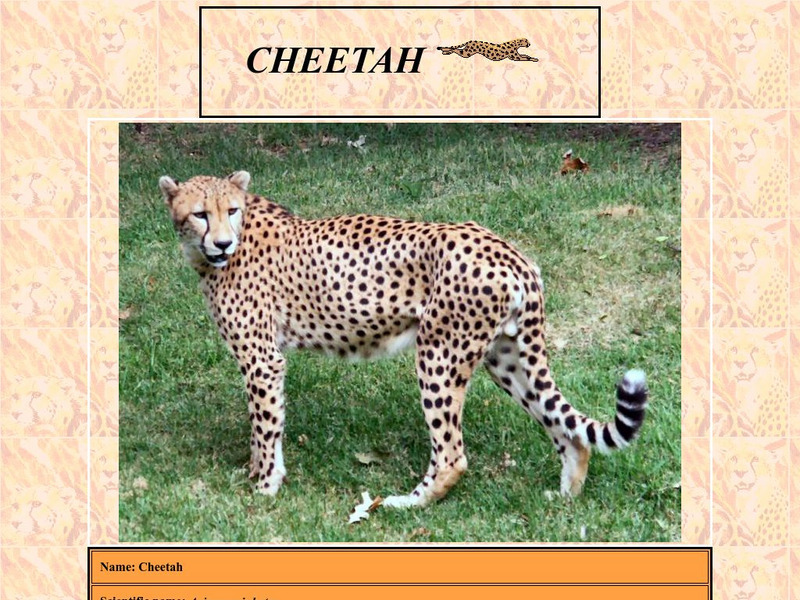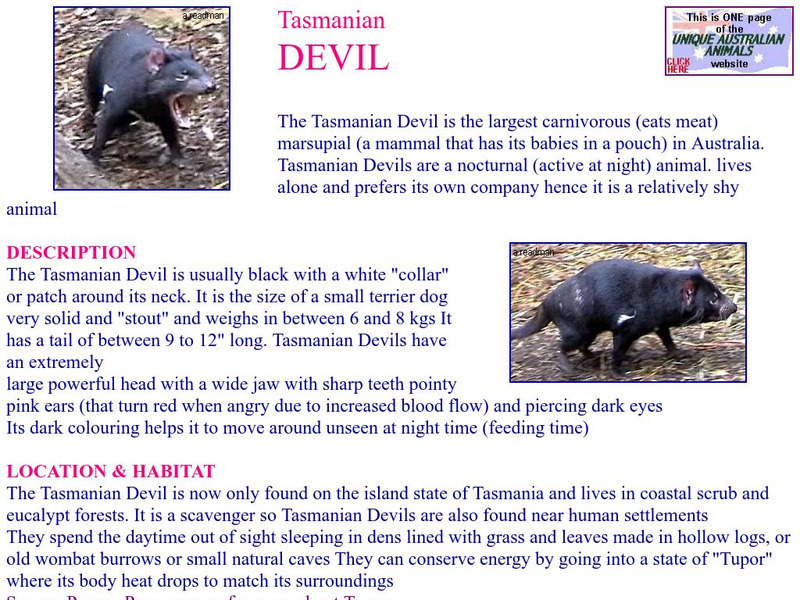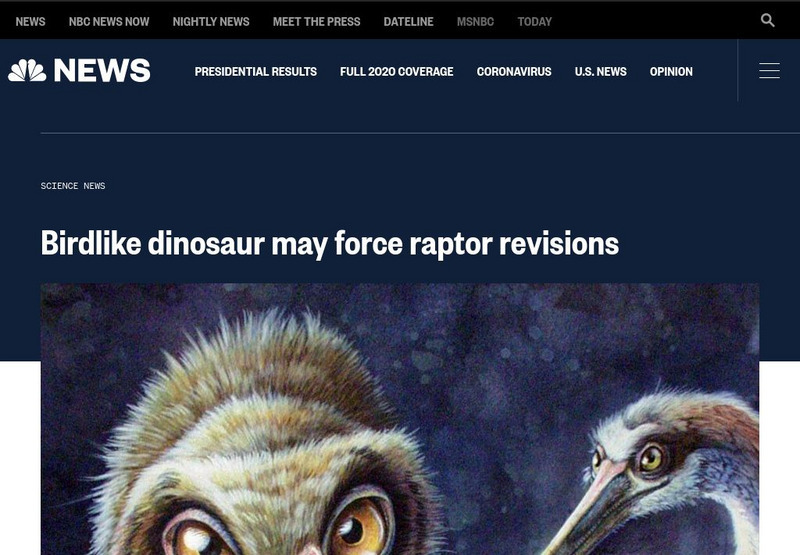Mocomi & Anibrain Digital Technologies
Mocomi: Insectivorous Plants Facts
There are special plants which grow in exceptional environments which behave differently than most plants we are familiar with. Explore the world of insectivorous plants.
Science and Mathematics Initiative for Learning Enhancement (SMILE)
Smile: The Effects of Pesticides on the Food Chain
Lesson plan to construct and explain a food chain. Includes games and activities to teach and reinforce concepts.
Science and Mathematics Initiative for Learning Enhancement (SMILE)
Smile: Teeth Identification in Omnivores, Herbivores and Carniv
In this lesson plan, students make puppets out of paper bags and use corn to give their animal (dinosaur, raccoon, etc.) the correct type of teeth based on the animal's diet.
Other
Wikipedia: Simple English Wikipedia: Herbivores
An easy-to-read entry on herbivores which explains not only what herbivores are, but also the different kinds of herbivores and their diets.
Other
Who Zoo: Cheetahs
This site gives a great set of Cheetah images along with in depth descriptions. Links to additional information are listed at the bottom of this site.
Other
My Science Box: Food Chains
Students will use a card sorting activity to construct a food chain and identify the role of organisms within that chain. The cards represent different individuals in an ecosystem and will help students begin to understand the concepts...
Australian Broadcasting Corporation
Australian Broadcasting Corporation: Walking With Dinosaurs: Fact File: Dwarf Allosaurus
A very brief look at the Dwarf Allosaur, revealed to scientists via a single bone found in Australia. Read about its size in comparison to the Allosaurus, and view several images.
Australian Broadcasting Corporation
Australian Broadcasting Corporation: Walking With Dinosaurs: Fact File: Allosaurus
An information page about the dinosaur, Allosaurus.
Australian Broadcasting Corporation
Australian Broadcasting Corporation: Walking With Dinosaurs: Fact File: Tyrannosaurus
An information page about the Tyrannosaurus Rex.
Smithsonian Institution
National Museum of Natural History: Where Do Mammals Live: Lion
Illustrated overview of the lion explains how the different roles of males and females help lions survive in their habitat.
ClassFlow
Class Flow: Polar Bears
[Free Registration/Login Required] This flipchart is a brief overview of polar bears.
Canadian Museum of Nature
Canadian Museum of Nature: Striped Skunk
The Canadian Museum of Nature offers a detailed drawing of a striped skunk followed by a brief description of the animal.
Discovery Education
Discovery Education: Rome's Influence
A lesson plan which has students understanding the impact that Rome had on history, from things as diverse as city planning to our everyday vocabulary.
Unique Australian Animals
Unique Australian Animals: Tasmanian Devil
The Tasmanian devil is a real Australian marsupial mammal and nothing like the cartoon character as you will find out in this illustrated article.
NBC
Msnbc.com: Birdlike Dinosaur May Force Raptor Revisions
Fossils found in Argentina have led scientists to change the way they think about the evolution of dinosaurs. A relative of the velociraptor has been found that demonstrated bird-like features. Learn more about these fossils here. [Date...
ClassFlow
Class Flow: Food Chains
[Free Registration/Login Required] Through this flipchart students will be able to summarize and organize simple food chains.
Science Struck
Science Struck: Food Chain in the Tundra Region
Describes the characteristics of a tundra biome, how a tundra food chain compares to a tropical food chain, and what the different trophic levels look like.
Science4Fun
Science4 Fun: Shark
Learn about the appearance, diet, habitat, conservation status, and other fun facts about this large predator fish.
PBS
Pbs Nature: Sharks
How many species of sharks are there in the world of water? Students will discover how and where sharks live, what they eat and how they socialize through the exploration of this resource.
BBC
Bbc: Planet Dinosaur
In the Planet Dinosaur, players must eat as much as they can so they can grow from a baby into an adult Allosaurus. Along the way, they also need to mate with as many females as they can. Students learn about the different prehistoric...
Curated OER
Ar Kive: Tiger (Panthera Tigris)
One of the largest of the 'big cats', the tiger (Panthera tigris) is an instantly recognisable animal and an iconic symbol of conservation. Nine different subspecies of this charismatic carnivore are recognised, three of which became...
Curated OER
Ar Kive: Polar Bear (Ursus Maritimus)
The polar bear (Ursus maritimus) is the largest living land carnivore, with adult males growing up to 2.6 metres in length. The most well known of all bears, the polar bear is immediately recognisable from the distinctive white colour of...
Curated OER
Science Kids: Science Images: Polar Bear With Cubs
This photo shows a polar bear with two cute cubs sitting in the snow. Polar bears are native to the Arctic Circle and are classified as a vulnerable species. Polar bears are the largest type of bear and also the largest carnivores that...
Curated OER
Science Kids: Science Images: Spinosaurus Skull
This picture is a diagram of a Spinosaurus skull. Spinosaurus lived in the Cretaceous Period (around 100 million years ago) and was a huge meat eating dinosaur, possibly the largest carnivorous dinosaur ever. For more information on this...
Other popular searches
- Carnivore +Herbivore(teeth)
- Herbivores Carnivores
- Carnivore Herbivore
- Omnivore Herbivore Carnivore
- Producers and Carnivores
- Herbivores and Carnivores
- Herbivore and Carnivore
- Herbivores. Carnivores
- Herbivore Carnivore Teeth
- Carnivores Omnivore Herbivores
















